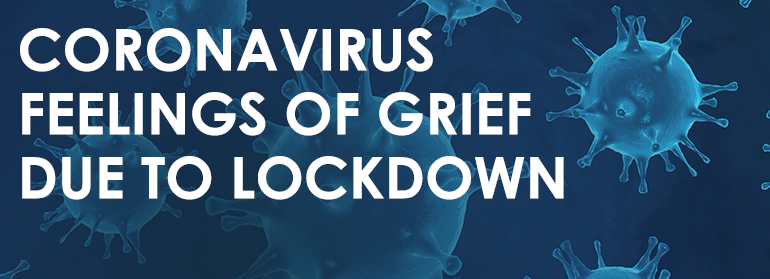
15 Apr Feelings of Grief due to Lockdown
There are many emotions that we are feeling during this period of lockdown. We will undoubtedly have experienced periods of denial and possible disbelief in the early days, that this situation has come to what it has in such a short space of time. Some of those who are not fully participating in the current rules and guidelines could still be in this phase of thinking, although I think many of us would agree that it now resembles feelings of entitlement, especially this long into our psychological transition.
Feelings of sadness are due to the many changes that have happened in our lives, much of which is underpinned with feelings of loss. The loss and change of the lives we all had, the intensity of our relationships, our ability to work normally and, of course, the changes and loss in financial security. These losses are also likely to trigger feelings of anger about the current situation; the circumstances of restriction with a lack of freedom will inevitably lead to frustration at the very least.
Hopefully, on our better days, we feel like we are dealing with and accepting the situation better than we thought and even in lockdown, we are beginning to feel a new sense of normal. These emotional states, similar to the grief we feel when we lose a loved one, are certainly not experienced in an orderly manner. The motions of circumstantial grief can be also be chaotic. Our emotions jump from one state to another as we process the losses we are experiencing. We also have levels of apprehension and anticipation about what lies ahead for us all, which complicates our feelings further.
This anticipatory grief unsettles our sense of safety and security to what lies ahead. Even though we know this situation is temporary, it doesn’t help ease these feelings now. It is important that we label what we are feeling and learn to sit with our negative emotions as they happen, so that that they move onwards. Resisting what we feel leads to a greater intensity of emotion, coupled with a desperation to get rid of them. Emotional freedom only occurs when we accept what we feel. So, name it, claim it and let the feeling move on from you. This will not only help with what you are feeling today, but how you feel after this situation has changed.
We are all doing the best we can under extremely challenging circumstances. Be patient, be kind and remember, this will change.
Dealing with feelings of circumstantial and anticipatory grief
- Give yourself time to process what you are feeling. Name the emotions and try to sit with them for a while so that they move on from you
- Connect with your loved ones by sharing what you feel and be there for others, as they will be feeling it too. You are not on your own with this. These are collective feelings of grief
- Try to remember what you can control and let go of the things you can’t
- Remember, this will change. Your emotions will change, your perspective on this will change, the situation will change
- Try to find a sense of meaning in this process. What is it teaching you? How might it change things for the better?
- Learn how to be together in this new situation. Talk, listen and, more importantly, look for things in common
- Be patient with your loved ones during lockdown. We can’t distance ourselves from people and situations that might trigger negative feelings within us. Recognise other people’s short fuses are as a result of the lockdown. Bite your lip, take yourself to another space and do your best to regulate your negative emotions for short-term and longer-term benefits
- If your thoughts and feelings are racing ahead and activating feelings of anxiety and fear, try to notice where your thoughts are and gently bring them back to the present. Remember, in this moment you are okay
- Activate greater compassion for yourself and others. This isn’t a time to give too much time to our critical mind. Be kind, you are doing your best


